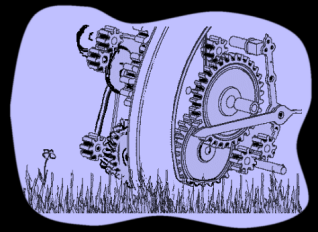“When we talk to God we are praying; when God talks to us, we are schizophrenic.” – Lily Tomlin
God is usually kept at a safe distance. It’s politically correct to mention his deeds, his presence, and it’s perfectly okay to use his name (well, some of his names, depending on your exact education) on bills of money and inside thick books. Yet, one should not get too explicit with this trend, or he or she loses all credibility.
Try this experiment: Approach a police officer, or a judge, or a teacher of religion, and insist that you had a chat with God yesterday – a real discussion, not one over the Internet or within your heart. Try to present some hard evidence – something like a piece of paper given to you by the Almighty, with some clearly stated divine message. Don’t forget to take with you some extra clothes for one night, and a toothbrush. You may need them later.
The question “Do you believe in God?” is perhaps the second most asked question in the world (after “How are you?”). If for a moment we ignore the strange urge to ask a question whose answer is supposed to be in consensus, we’re left with a question that lacks some basic elements.
What does it mean to ‘believe in’ something? From the general linguistic aspect, if you really believe something is true, you normally don’t say, “I believe it’s true”. You simply say, “It’s true”. Furthermore, “I believe this is what happened” is frequently used to imply, “I think this is what happened, but I’m not sure”. And if God is part of a belief, then why do so many preachers attempt to prove its existence? Let’s continue with the obvious fact that this question is not fully defined in one more aspect: What is the meaning of this strange word, ‘God’? If both the person who asks and the person who answers share the same interpretation of this word, then this by itself is a giant step towards recognizing the concepts involved in the original question.
So what is the meaning of the word ‘God’ in the above question? You can find a great number of definitions. Some of them are not so problematic: God is everything, God is everywhere, are real close to the ‘God = Nature’ equation (remember Spinoza?). Some may assign this name to the set of basic rules of physics, driving our universe. In that sense – yes, it’s quite difficult not to believe in such a ‘God’.
Even so, you’ll often hear of ‘God’ as the creator. Have you ever heard the famous watchmaker analogy? A man walks in an open field and suddenly observes a shiny object from a distance. As he gets closer to the object, he sees a beautiful watch visibly lying in the dirt, ticking the time. He concludes that someone must have created this nice and complex object – there’s no way it could create itself. Similarly, if you look around at our beautiful and much more complex world, you must come up with an analogous conclusion: Someone must have created this masterpiece.

Neat, eh? So what is more complex – the watch or the world around it? Observe that in the beginning of our little story, the watch was the more complex object, while in its end, the world around it turned out to be much more complex… Note also that given enough time, there is a way that nature around us could be created by itself based on the rules of physics. Every scientist will tell you how this can be, at least when they are talking in reality mode (hope you still remember the previous chapters!).
And by the way, the reason we thought the watch had been created by someone has nothing to do with complexity. We thought so because it looked artificial and contained objects whose shapes were too perfect for the natural surroundings and too different from it. We would have thought the same seeing only a single hand of the watch.
Moreover, much of the complex living kingdom around the watch has been formed gradually, through processes of multiplication and natural selection. No watches have been seen multiplying, yet.
Logic is a true competitor of religion, even if, as in some Jewish Talmudic discussions, these two sometimes interestingly attempt to approach each other.
Let’s leave the complex watch ticking and go back to the complex world (or universe, if you will). There’s no argument that the world around us is complex. Complexity is, of-course, a relative thing. It depends on our own ability to memorize many details and understand the relationships between them. A modern PC is very complex. A car engine is also complex. In the eyes of a domestic cat, a mousetrap is probably a miraculous object. We’ll come back to this point in a later chapter.
But assuming the universe is really, really, really complex, does it necessarily mean it must have been created by someone? If so, then this creator must have been extremely complex himself. Hence, using exactly the same logic, someone must have created him as well…
Further, what does this complexity have to do with baptism? Is the beauty of the world enough reason to eat kosher? Should the intriguing laws of physics dictate pilgrimage to Mecca?
You may have heard the elusive claim: “There’s no proof that there’s no God”. Who says there’s a single creator? There’s also no proof that there aren’t two Gods. Perhaps there are several Gods? Perhaps there’s a whole super-universe filled with super-creatures playing with inferior universes such as ours, just like in some science fiction stories?
<< Prev Contents Next >>






